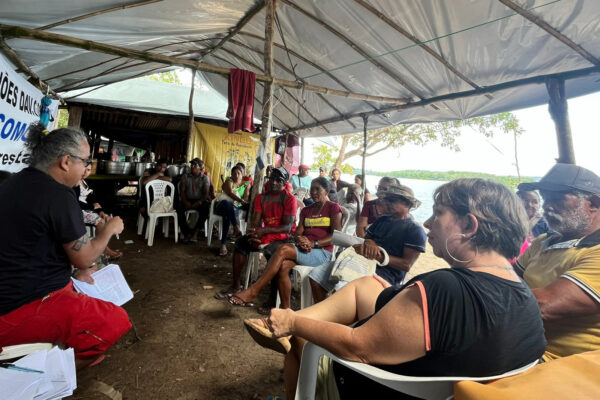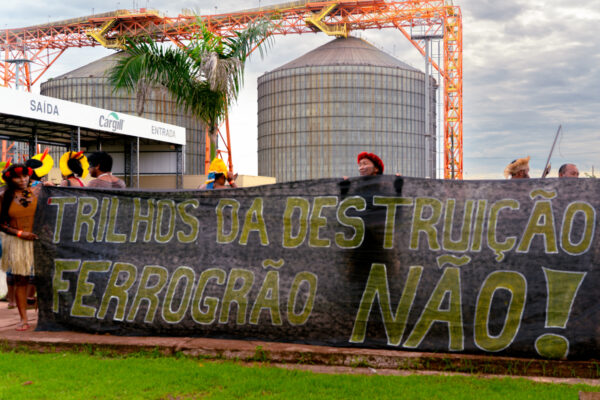International Verification Mission on the Human Rights and Humanitarian Situation for Indigenous People in Colombia
Report from the Commission to the Sierra Nevada region
September 21 – 23, 2006
The International Verification Mission (MIV), which visited Indigenous Peoples in the Sierra Nevada Region of Colombia, included the following organisations:
Representatives from the Diplomatic Corps: Swiss Embassy, Delegation of the European Commission
International Organizations (as observers): MAPP–OAS, UNHCR, OCHA
Non-governmental and civil society organizations: A Sud Associaton (Italy), Comité Daniel Gillard (Belgium); Colombia Human Rights Committee (USA); Suippcol (Swizerland); José Alvear Restrepo Lawyers´ Collective
Others: Loire-Atlantique Regional Council (France), Academic Researcher, University of Bergen (Norway)
The commission met with indigenous authorities, spiritual leaders, community elders and women representing the four Indigenous Peoples in the Sierra Nevada de Santa Marta region (Arhuaco, Kankuamo, Kogui and Wiwa). In addition, we spoke with leaders from the Wayúu Peoples from the Guajira region, and with the Mokaná People from Atlántico, and with the displaced Kankuamo population living in the city of Valledupar. The Mission regrets not having the opportunity to meet with representatives from the Chimila and Yukpa Peoples due to their current dramatic and worrying situation of confinement, as described by the indigenous authorities present. As part of the visit, the mission also held a meeting with representatives from the Mayor´s Office in Valledupar, the Cesar Governor´s Office, State civilian authorities, and state security forces.
The ancestral lands of these communities are part of Colombia´s cultural richness and biodiversity; in fact, the Sierra Nevada de Santa Marta has been declared a World Heritage Site by UNESCO. For this reason and also taking into account the magnitude and duration of the grave violations of the fundamental individual and collective human rights of these Peoples, as members of the mission we feel it is our responsibility to visibilise what we observed during our visit to the Colombian and international community.
The mission observed that in spite of the norms established in the Colombian Constitution of 1991 and in International Labour Organisation Convention 169, among other national and international commitments signed by the Colombian State, which upholds the rights of indigenous peoples to autonomy, territory, and fundamental human rights, these rights continue to be affected by the State’s failure to implement the recommendations made by Rodolfo Stavenhagen, the United Nations Special Rapporteur on the Human Rights and Fundamental Freedoms of Indigenous Peoples, in his 2004 report.
In addition, the testimonies received during the mission reveal that the actions of illegal armed actors in indigenous communities have provoked selective killings, massacres, forced disappearance, displacement, sexual attack and abuse of women and girls, among other violations, which have led to terror in the population. Also of extreme concern is information gathered during the mission, according to which there continue to be cases of human rights violations through action or lack of action by state agents, such as mass and arbitrary detention, torture, selective murders, forced disappearances, prolonged attacks and smear campaigns. While it is the Kankuamo People who have suffered the most from violence over the past years, as illegal armed actors and the Colombian state army have moved to different parts of the Sierra, so the Wiwa, Kogui and Arhuaco peoples have also suffered the consequences of the armed conflict.
It is alarming that according to testimonies and reports received before and during the mission, over the last 5 years the Kankuamo people alone have suffered 228 selective political murders of their political and spiritual leaders, women, and other members of their communities, leaving behind 200 widows and 700 orphans. To date, no one has been punished for these crimes.
According to testimonies, communities are put at risk by the establishment of military bases in the heart of indigenous territories. The same sources are concerned at the interference of state security forces in community life, using health outposts, constructing schools, organizing civil-military campaigns (health brigades and community kitchens), thus breaking the norms for community living established by traditional indigenous authorities. Likewise, the Mission received reports that sacred sites have been destroyed by legal and illegal armed actors.
The FARC violate indigenous autonomy by accusing them of collaborating with paramilitary groups or with the State, as in the case of an indigenous Kankuamo woman who was murdered by the guerrilla for washing the uniform of a soldier from the Colombian state army.
On an ongoing basis, the Kankuama and Wiwa indigenous communities have been subjected to smear campaigns, which accuse them of being guerrillas or their supporters. These communities are the victim of mass, arbitrary detentions with no respect to due process, making it impossible for the detained persons to defend themselves. In some cases, they are transferred to prisons far from their place of origin, as in the case of 10 detained Kankuamo People, being held on charges of rebellion.
Through testimonies from Kankuamo communities, the mission was alerted to the presence of demobilized members of the United Self-Defense Forces of Colombia (AUC) in the indigenous territories in La Mesa and Rioseco, who continue to intimidate the population and carry out acts the authorities determine to be “delinquent.”
The mission is extremely concerned at the situation of the displaced indigenous population in the city of Valledupar, as well as those displaced within their own territories. The absence of programmes and projects to assist around 400 displaced families in Valledupar affects their fundamental right to healthcare, education and security. Likewise, the mission is concerned by the lack of guarantees for the return of families to Murillo, and at news of the displacement of approximately 40 families to Bogotá.
The preservation of ancestral territory is fundamental to the identity and survival of indigenous peoples. All Indigenous Peoples in the Sierra see their rights affected not only because of the armed conflict, but also due to the exploitation of natural resources in their ancestral territories. The mission is extremely concerned about the implementation of public development plans and large infrastructure projects in the traditional indigenous territories in the Sierra Nevada, as in the case of the multi-purpose dam project in Los Besotes (in Arhuaco and Kankuamo territory), as well as the dam in the Ranchería River (in Wiwa territory), implemented without the process of prior consultation established in international norms. On the same subject, the Mission would like to draw attention to agreements signed between the National Government and the Indigenous Peoples of the Sierra Nevada in December 2001.
Along the same lines, the mission received testimonies concerning the adverse effects of the eight large infrastructure projects (already or about to be implemented) in Wayúu ancestral territory in the department of La Guajira. According to these testimonies, there are demobilized paramilitaries present in the region who continue to maintain control over the civilian population. Also of extreme concern is the murder of 16 women leaders who were part of a resistance process to these infrastructure projects in their territories.
Finally, the mission heard worrying testimonies from Kankuamo authorities, related to the presence and actions of the police inspectors (appointed by the state) within communities, affecting self-governance in indigenous territories and generating an incompatible imposition of authority inside indigenous territories.
Recommendations:
To the Colombian Government
1. Work towards a peaceful, negotiated solution to the internal armed conflict in Colombia.
2. Comply with the recommendations made by Rodolfo Stavenhagen in his 2004 report, prioritizing recommendations numbers 91 and 97.
3. Implement recommendation number 5 made by Louise Arbour, the United Nations High Commissioner for Human Rights, in her 2005 report relating to the defense, protection and promotion of the rights of vulnerable groups.
4. Respect and implement the agreements signed between the Colombian Government and the Consejo Territorial de Cabildos (CTC), Indigenous Leaders’ Council on Territories, in December 2001, with the Indigenous Peoples of the Sierra Nevada.
5. Implement a process, in consultation with Indigenous Peoples, which includes a differential focus on indigenous matters.
6. Resolve the problems related to the figure of Community Police Inspector as related to indigenous authorities in Kankuamo territories.
7. Revise the role of military forces, in terms of the social role they have undertaken in indigenous communities. In particular, the Mission reminds the government that the Inspector General made a statement against substituting Ministerial functions with programmes implemented through the armed forces.
8. Guarantee the lives of spiritual and political indigenous leaders, defenders of indigenous rights, and in particular, of people protected by precautionary and provisional measures.
Attorney-General’s Office (Fiscalía) and Inspector General’s Office (Procuraduría)
9. Investigate, sanction and punish those who both planned and carried out crimes denounced to the. Attorney-General.
From the Mission to the International Community
10. Continue to support the organizational strengthening of indigenous communities.
11. Call upon the United Nations agencies present in the Sierra Nevada de Santa Marta, the mission to support the peace process in Colombia of the Organization of American States – MAPP-OEA, the national and regional government, state civilian authorities, International NGO’s, and indigenous authorities in the Sierra, to form a Mixed Verification Commission to follow up on the recommendations by the International Verification Mission and the agreements signed between the Consejo Territorial de Cabildos – CTC – Indigenous Leaders´ Council on Territories, and the Colombian Government.
To the illegal armed actors
12. Respect indigenous territories, authorities, and communities as established under International Humanitarian Law.
Bogotá, Colombia
29 September 2006













